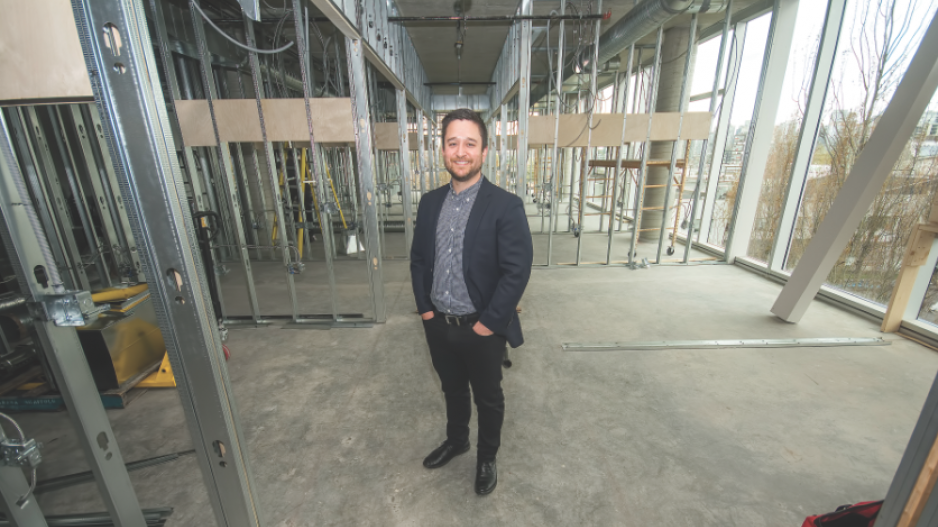Like foosball tables and free bagel days, co-working spaces were once the domain of tech startups.
Recent corporate buy-in to the concept and record-low office vacancy rates in Vancouver’s downtown core are now ramping up the co-working trend in one of the city’s burgeoning tech hubs: Mount Pleasant.
Five co-working spaces have popped up recently in the area between Broadway and the Olympic Village, often dubbed Mount Pixel due to the proliferation of tech companies.
Two more companies have announced the launch of new co-working spaces since the beginning of the month. And a third, Envision Co-Working, is advertising itself online as “coming soon to Mount Pleasant.”
“Mount Pleasant, just given its location and proximity to downtown and services and amenities, [is] a really logical alterative to the users who would otherwise locate downtown,” said Pavilion Cowork managing director Yosh Kasahara.
Pavilion, a new subsidiary of residential real estate developer Alabaster Group, opens its Mount Pleasant co-working location this summer.
The neighbourhood was traditionally geared towards light-industrial zoning until city hall began allowing more office space earlier this decade.
Visual effects house DNEG, which brought home an Oscar this year for its work on First Man, is a few blocks north of �鶹��ýӳ��tech mainstay Hootsuite Inc.
Animation studio DHX Media is a five-minute walk west of DNEG, while five breweries sit nearby.
Detached homes are sprinkled throughout the area, while a new generation of glass-facade office buildings is completing construction amid aging grey and brown structures.
“The area itself has become this vibrant market for companies that are looking for a different position outside of the traditional downtown core. And suddenly you’ve built this really powerful ecosystem of media companies and tech companies that feed into the market,” said Wayne Berger, CEO for Canada and Latin America at IWG, which owns the Spaces co-working company.
Spaces announced this month it’s opening a 38,000-square-foot co-working space on Great Northern Way, near the BC Tech Association’s offices and the Centre for Digital Media.
The first tenant, the Centre for Entertainment Arts, has already maxed out the capacity before its opening, slated for September.
“With the whole move towards flexibility due to cost savings, I think you’re going to see the traditional lease model completely shift away,” Berger said.
He pointed to new global accounting principles, International Financial Reporting Standard (IFRS) 16, which went into effect this year as one factor making the traditional leasing model “slowly deteriorate.”
IFRS 16 requires commercial real estate leases lasting more than 12 months to be captured as a liability on the balance sheet.
“So it doesn’t change companies’ cash flows but it changes their posted EBITA [earnings before interest, taxes and amortization],” Berger said, adding this has been spurring companies in 2019 to consider co-working spaces.
Chris Potter, PwC Canada’s national real estate tax leader, said there are other factors beyond IFRS 16.
Potter pointed to the changing nature of work, changes in workforce demographics, the rise of the gig economy, and the adoption of co-working spaces by small and large enterprise alike as other big influences.
“I don’t think it’s a fad,” he said, adding low vacancy rates and high lease rates in �鶹��ýӳ��and Toronto are priming those markets for co-working spaces.
Vancouver’s vacancy rate stood at 3.8 per cent by the end of the fourth quarter of 2018 — down 1.2 percentage points from a year earlier, according to a report from commercial real estate services company CBRE Ltd.
For big companies that remain downtown, co-working spaces have proven a popular alternative to long-term leases.
Deloitte Canada is set to move 700 workers into Spaces’ five-storey, 78,000-square-foot site on the Granville strip this fall.
And Amazon.com Inc. is filling up multiple floors at WeWork Cos. Inc.’s Bentall Centre location as the tech giant awaits the completion of its new offices at the old Canada Post building on Georgia Street.
“There are local companies who need expansion space. There are global companies who are looking to grow into the �鶹��ýӳ��market and that want to expand with satellite offices here that are all finding it difficult to secure their own office space,” Kasahara said.
“It’s not just tech companies and startups anymore.”
��



